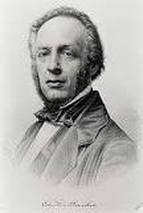BEECHER, EDWARD

(27 August 1803, East Hampton, NY-28 July 1895, Brooklyn, NY). Education: B.A., Yale College, 1822; studied at Andover Seminary, 1824-25. Career: Headmaster, Hartford Academy, 1822-24; tutor, Yale College, 1825-26; minister, Park Street Church, Boston, 1826-30; president, Illinois College, Jacksonville, IL, 1830-44; minister, Salem Street Church, Boston, 1844-55; editor, Congregationalist, 1849-53; minister, Galesburg, IL, 1855-71; lecturer, Chicago Theological Seminary, 1859-66; assistant editor, Christian Union, 1871-73.
On a November night in 1837 Edward Beecher stood beside his friend and fellow minister Elijah P. Lovejoy as a mob attacked the warehouse in which Lovejoy published an antislavery newspaper. They held off the mob, but the next night the antiabolitionists caught Lovejoy and lynched him. Losing his close friend to vicious men who were defending an evil institution sharpened Beecher's thinking about religion and society.
As President of Illinois College, a struggling institution in the heart of a proslavery region of Illinois, he had been reluctant to take a strong position on abolition. But now as theologian he argued that since God's law is the fundamental law of the universe, people and nations should reject compromises with evil, however convenient. He publicized Lovejoy's death in A Narrative of the Riots at Alton, helped organize the state's first antislavery society, and supported students who were indicted by the local grand jury for helping runaway slaves.
Beecher upheld traditional Calvinist ideas about human sinfulness and divine majesty. But like most other theologians of his time he was influenced by the atmosphere of the Enlightenment and sought to make God's favor accessible to deserving individuals. People, he said, came from a previous existence in which they had sinned; so they were responsible for their own shortcomings. But God made it possible for them to work for salvation and helped them by suffering on the cross. So men and women must strive for holiness in their own lives and must fight against evil in an imperfect world.
Bibliography
A: On the Kingdom of God (Boston, 1827); A Narrative of the Riots at Alton (Cincinnati, 1838; New York, 1965); Baptism, with Reference to Its Impact and Modes (New York, 1849); The Conflict of Ages (Boston, 1853, and subsequent editions); The Papal Conspiracy Exposed (Boston, 1855); The Concord of Ages (New York, 1860); History of Opinions on the Scriptural Doctrine of Retribution (New York, 1878).
B: DAB 2, 128; DARB, 34-35; NCAB 3, 128; NYT 29 July 1895, 1; SH 2, 24; Robert Merideth, The Politics of the Universe: Edward Beecher, Abolition, and Orthodoxy (Nashville, 1963).
On a November night in 1837 Edward Beecher stood beside his friend and fellow minister Elijah P. Lovejoy as a mob attacked the warehouse in which Lovejoy published an antislavery newspaper. They held off the mob, but the next night the antiabolitionists caught Lovejoy and lynched him. Losing his close friend to vicious men who were defending an evil institution sharpened Beecher's thinking about religion and society.
As President of Illinois College, a struggling institution in the heart of a proslavery region of Illinois, he had been reluctant to take a strong position on abolition. But now as theologian he argued that since God's law is the fundamental law of the universe, people and nations should reject compromises with evil, however convenient. He publicized Lovejoy's death in A Narrative of the Riots at Alton, helped organize the state's first antislavery society, and supported students who were indicted by the local grand jury for helping runaway slaves.
Beecher upheld traditional Calvinist ideas about human sinfulness and divine majesty. But like most other theologians of his time he was influenced by the atmosphere of the Enlightenment and sought to make God's favor accessible to deserving individuals. People, he said, came from a previous existence in which they had sinned; so they were responsible for their own shortcomings. But God made it possible for them to work for salvation and helped them by suffering on the cross. So men and women must strive for holiness in their own lives and must fight against evil in an imperfect world.
Bibliography
A: On the Kingdom of God (Boston, 1827); A Narrative of the Riots at Alton (Cincinnati, 1838; New York, 1965); Baptism, with Reference to Its Impact and Modes (New York, 1849); The Conflict of Ages (Boston, 1853, and subsequent editions); The Papal Conspiracy Exposed (Boston, 1855); The Concord of Ages (New York, 1860); History of Opinions on the Scriptural Doctrine of Retribution (New York, 1878).
B: DAB 2, 128; DARB, 34-35; NCAB 3, 128; NYT 29 July 1895, 1; SH 2, 24; Robert Merideth, The Politics of the Universe: Edward Beecher, Abolition, and Orthodoxy (Nashville, 1963).
